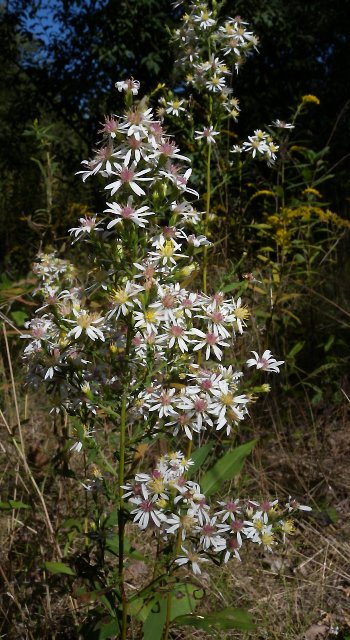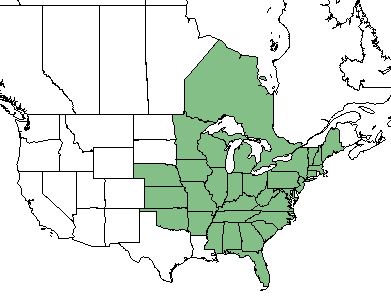Difference between revisions of "Symphyotrichum urophyllum"
(→Ecology) |
(→Taxonomic Notes) |
||
| Line 20: | Line 20: | ||
==Taxonomic Notes== | ==Taxonomic Notes== | ||
| − | Synonym(s): ''Aster sagittifolius''; ''A. urophyllus'' | + | Synonym(s): ''Aster sagittifolius'' Wedemeyer ex Willendow; ''A. urophyllus'' Lindley ex A.P. de Candolle'' |
==Description== <!-- Basic life history facts such as annual/perrenial, monoecious/dioecious, root morphology, seed type, etc. --> | ==Description== <!-- Basic life history facts such as annual/perrenial, monoecious/dioecious, root morphology, seed type, etc. --> | ||
Revision as of 19:50, 28 June 2018
| Symphyotrichum urophyllum | |
|---|---|

| |
| Photo by John Hilty hosted at IllinoisWildflowers.info | |
| Scientific classification | |
| Kingdom: | Plantae |
| Division: | Magnoliophyta - Flowering plants |
| Class: | Magnoliopsida - Dicots |
| Order: | Asterales |
| Family: | Asteraceae |
| Genus: | Symphyotrichum |
| Species: | S. urophyllum |
| Binomial name | |
| Symphyotrichum urophyllum (Lindl.) G.L. Nesom | |

| |
| Natural range of Symphyotrichum urophyllum from USDA NRCS Plants Database. | |
Common Name(s): white arrowleaf aster[1][2]
Contents
Taxonomic Notes
Synonym(s): Aster sagittifolius Wedemeyer ex Willendow; A. urophyllus Lindley ex A.P. de Candolle
Description
Symphyotrichum urophyllum is a dioecious perennial forb/herb.[2] It prefers dry sandy loamy soils and produces white flowers.[3]
Distribution
This species can be found from Maine, south to Florida, westward to Mississippi, and inland to Oklahoma, Kansas, Nebraska, Minnesota and the remaining eastern portion of the United States.[1][2] It is also found in the Ontario province of Canada.[2]
Ecology
Habitat
S. urophyllum occurs in woodlands, savannahs, forest edges, prairies, meadows, and fields.[3]
Phenology
Flowering occurs in late August through October.[1]
Pollination
This species is known to attract a variety of butterflies and native bees.[3]
Conservation and Management
Cultivation and restoration
Photo Gallery
References and notes
- ↑ 1.0 1.1 1.2 Weakley AS (2015) Flora of the Southern and Mid-Atlantic States. Chapel Hill, NC: University of North Carolina Herbarium.
- ↑ 2.0 2.1 2.2 2.3 USDA NRCS (2016) The PLANTS Database (http://plants.usda.gov, 12 January 2018). National Plant Data Team, Greensboro, NC 27401-4901 USA.
- ↑ 3.0 3.1 3.2 Plant database: Symphyotrichum urophyllum. (12 January 2018) Lady Bird Johnson Wildflower Center. URL: https://www.wildflower.org/plants/result.php?id_plant=SYUR